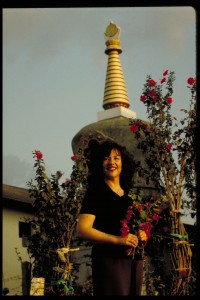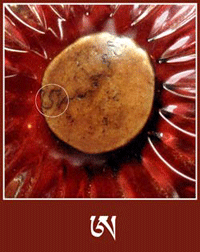
The following is an excerpt from a teaching by Jetsunma Ahkon Lhamo called “Antidoting the Mantra of Samsara”
So here’s the question. Here’s what we ask ourselves, and it’s a valid question. When you are doing prostrations, or maybe reciting a mantra, and that’s another thing you have to do, at least a 100,000 times on several mantras. Wouldn’t it be just as good rather than sitting there for say, I don’t know, half an hour Om Mani Padme Hung, Om Mani Padme Hung, half an hour? Half an hour is a short time to accumulate, but let’s say, rather than sitting there for half an hour, what if we said one really good Om Ah Hung Benzar Guru Padme Siddhi Hung? What if we said it so good that it’s like the best mantra that anyone has ever said? What if we said it so good that we are completely absorbed? Rather than saying it 100,000 times, per syllable, which is how you spell, well anyway, you’ll learn about that later, what if you said it once, really good? First of all you could pronounce it really perfectly, which nobody in America can do yet, but you know, you can pronounce it really perfectly, and then while you’re pronouncing it, you can remain in complete absorption. Isn’t that one of those kind of funny hand things that you see people doing in the New Age? Where we can do it in complete absorption. Let’s say that we can do it in such total absorption that even if lightning were to strike, we would be immovable, in immovable samadhi reciting that one mantra? Wouldn’t that be better than just saying Om Ah Hung Benzar Guru Padme Siddhi Hung, Om Ah Hung Benzar Guru Padme Siddhi Hung, Om An Hung Benzar Guru Padme Siddhi Hung? Sigh, Om Ah Hung Benzar Guru Padme Siddhi Hung. Wouldn’t that be better than a half an hour of that, don’t you think? That one mantra, that one glorious earthshaking, the earth moves beneath your feet mantra. So that’s the question everybody has. That’s the big question. Why do we have to say these things, the underlying question is WHY 100,000? You know, what fresh hell was concocted for us to make us have to recite this thing 100,000 times? Where is it written?
Well, let me give you some information about that. The reason why we ask questions like that is because of our lack of understanding. We have an idea that if a thing is O.K. on the surface, it’s O.K. We have an idea that if, well, I like to use the analogy, one of my favorite analogies is poop soup. So let’s talk about that a little bit. Poop Soup. What’s the recipe for poop soup. Well, poop soup is like, with poop soup you do pretty much what sentient beings do as they move through time. You collect everything nasty there is through our own habitual tendency. And here’s the part that we don’t understand. Our life didn’t begin 46 years ago, or 20 years, or 70 years ago, or however old we are. Our life didn’t begin at that time, but in fact the Buddha teaches us that we have existed as, with having the idea of self-nature as being inherently real, since time out of mind. And during that time, we have engaged in activity which was samsaric activity, mixed activity, meaning not understanding our nature, not understanding our qualities, not understanding the relationship between cause and effect. We simply engaged in an activity, instinctively and habitually, with very little understanding, and so we have accumulated mixed habitual tendencies, extremely mixed habitual tendencies including the habitual tendency of hatred greed and ignorance. So that’s like cooking up a big pot of poop soup.
Poop soup is basically all of the unclean things in samsara. You collect it all together in one pot and you stir it up real good, ummm, yummy, it’s poop soup so you can understand what the main ingredient is, can’t you? Poop soup, got it? O.K., so you stir it up, the fragrance of cooking fills your house. Wonderful, right? And so the first day you cook up your poop soup it looks like pretty much what it is, boiling poop soup. Right? And the second day you boil it some more because that’s how it is, life moves on. The poop soup is still boiling and the second day it looks pretty much like poop soup. And the third day things are happening. It begins to change. It’s looking sort of colorful now. Fuzzy in places, and colorful and you know, it’s changing. And everyday that you look at it, one day it’s kind of orangey, the next day it’s kind of purplely, it depends. It’s like different fuzzy little things that are growing on it. Poop soup changes every day. It’s just a cornucopia of colorful delight, the fragrance of which continues to fill your house.
Then one day, one day something magic happens. You go to check out your poop soup for the day and you notice that on top of your poop soup there is this wonderful soft furry layer of something pure and white. A white fuzzy something has grown on top of your poop soup. And here’s how we think! We think that now that our poop soup is all white and fuzzy and pure, it’s o.k. Now, the only reason why we think like that is because we don’t understand that in fact we are not superficial creatures. We aren’t that pure white stuff that’s growing on the top. We are deep creatures, meaning to say we didn’t just crawl out from under a rock. We didn’t just appear in space. We didn’t just start 35 years ago, 75 years ago, whatever it happens to be, but since time out of mind we have been making connections, we have been engaging in cause and effect relationships and we’re like that pot of soup. There are many many ingredients inside of us, and it’s a deep pot.
As we live, everything in that pot gets stirred up, from the bottom to the top, from the top to the bottom, from the side to the middle, it’s always getting stirred up. But we think of ourselves in a very superficial way, and what that means is that on the day when we come up somehow magically just because of chance, it’s almost like you know, it’s almost like the slot machines in Los Vegas. One day you’re gonna get three cherries. Well, one day your pot’s gonna look like it’s all white and pure and sweet, kind of like New York City when it snows. But you and I know that underneath there is a whole lot of trouble. Right? That’s true, but instead, how we think is that what’s on top is o.k.
So we have this idea, and actually this is how we think and it’s an unfortunate thing because it does not lead to self-honesty. It does not lead us to a way to actually engage in practice and really benefit ourselves. We think basically, because we think superficially, if you didn’t see me do it, if I didn’t get caught, I didn’t do it. That’s how we think. If you didn’t see me, I didn’t do it. If you didn’t catch me, it didn’t happen. What we are not taking into account is that we are deep creatures, that we have strong habitual tendencies that have, that we have engaged in since time out of mind, that we are extraordinary and complicated, that there are layers and layers and layers and layers of tapestry or fabric or weaving that are part of our nature.
To say one mantra, even if you say it so perfectly, so beautifully, pronounce it so well and do so with complete absorption, could not possibly counteract time out of mind worth of habitual tendencies and inappropriate negative or neurotic activity, which we have engaged in. So reciting one mantra meaningfully, or even reciting a series of them very meaningfully, could not possibly empty the depth, could not possibly purify the depth of that poop soup that we created or that we have lived with for so long.
So what we’re up against here is we are trying, we are using a technology that isn’t meant for a person who has only lived one life. We’re using a technology that really wasn’t designed, was not given to the world to cure a superficial problem. It was not given to us to heal a scratch. The technology of dharma is so extraordinary and so complicated, so deep, so effortful because of what it is supposed to do. What it has to do is a big job. What it has to do is to purify nonvirtuous habitual tendency that we have created and are deeply ingrained since time out of mind.
Copyright © Jetsunma Ahkon Norbu Lhamo. All rights reserved




